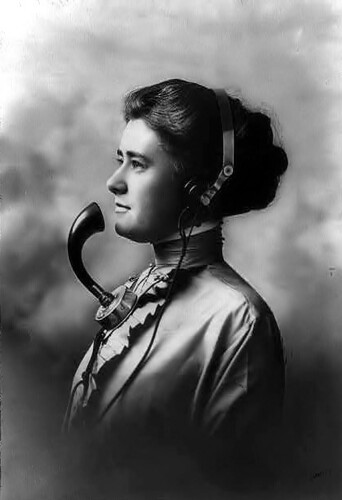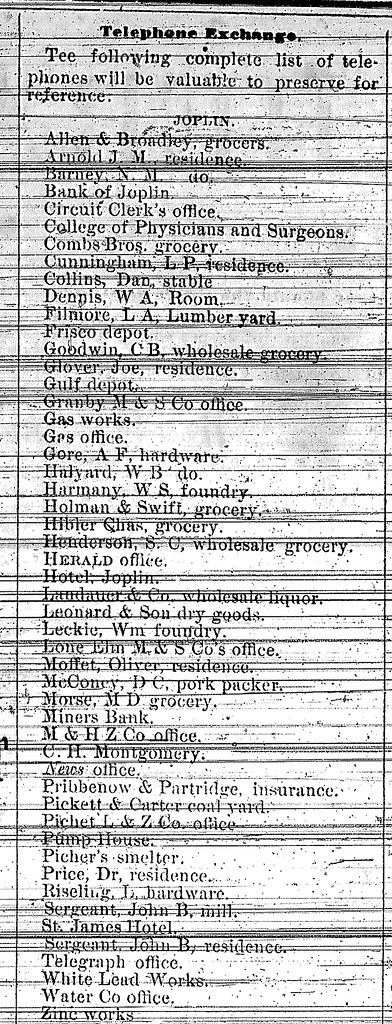In 1905, Joplin residents who picked up the phone to place a call would have heard a cheerful “Hello Central!” Joplin’s “Hello Girls” were said to be a “combination of encyclopedia, dictionary, city directory, blue book, weather vane, atlas, human alarm clock, and bureau of information in general.” Altogether there were thirty-five young women who were responsible for directing calls in the city of Joplin. Twenty-two of the telephone operators were assigned to the main line and answered an estimated 16,000 calls per day.
One night operator on the Bell line of the Missouri & Kansas Telephone Company spoke with a Joplin Globe reporter regarding an average work night. “Oh, they just ask everything,” the operator replied when asked what people asked when making a call. “So many people ring up to ask when the next street car goes to Carthage, or to Galena, and whether the East Joplin dinky is running today. Then there’s the trains. It would be folly for a central operator not to know the exact time of departure from and arrival of every train in Joplin, and if we don’t want to get our heads taken off by an information craving public, we’d better known just how late that Frisco from the west is tonight, and whether the Katy carries passengers on its local freight.”
It was also not uncommon for folks to pick up the phone to find out the time of day. The operator slyly remarked that she believed some folks did so just to save on the price of an office clock. Joplin residents also picked up the phone to find out where a fire was, often ringing up the operator to gasp, “Where’s the fire, Central?”
Although an operator might receive a dozens of calls on a night when the fire alarms rang incessantly, at least one operator did not mind the inquisitive phone calls, telling the Globe reporter, “We all sort of have a mutual interest in fires, and it’s a sort of human weakness, I’ll admit, to realize that we are very important for once in our little lives. It makes us sort of proud, you see, and we just answer away with might and main telling them all where the fire alarm came from.”
Other common questions the operators received were regarding the dates and times of church services, the location of specific mines, the meaning of words, the authors of books, and even “what the sign is when you dream you saw your fellow.”
Operators displayed patience with their customers, especially in the case of the elderly who were often hesitant to speak into a phone and would forget who they wanted to speak to, including one older lady who would call up and say, “Oh, I want to talk to a woman, she lives out on, oh, I forgot the street and I can’t think of her name. She’s a milliner.”
Besides patience, an encyclopedic knowledge of train schedules, businesses, and people, the other essential quality needed in a “Hello Girl” was youth. Acting Secretary H.E. Scovern of the Home Telephone Company told the reporter that, “It’s not altogether an easy thing to secure the desirable sort of operators. We have them here from fifteen years up, but the girl of seventeen makes the very best. She’s quick and alert and readily learns the run of the business and the professional men the line caters to. She must know them all, and there are something like 1,300 phones to keep in mind.” Scovern said a “Hello Girl” had the instinct of Sherlock Holmes and the cunning of an expert in the dead letter department at the Post Office. He praised one operator who, through her extensive memory and ability to analyze voices, could detect “fraudulent use of the toll board exchange” and despite the many “rag chewings and some unpleasantness” proved a “valuable guardian of the company’s interests.”
Sources: Library of Congress and the Joplin Globe.



